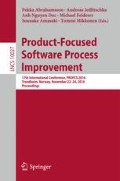Abstract
Efficient team communication is essential for software project success. Misunderstood or underestimated demands on customer requirements and insufficient information sharing within a team can rapidly cause the delay of software releases, hamper customer satisfaction or even endanger the project succeed. The challenges remain to quantify the right amount of communication according to durations, necessary effort, and the ambitions to avoid firefighting situations. Especially newly build or less experienced teams often struggle with their information flow. To improve team communication performances for these teams, we build an experience based classifier model that interpolates tendency forecasts with five approved team communication metrics from related work. The model matches archival project communications with present team conditions and computes tendency forecasts for the ongoing project. These future trends can indicate critical communication conditions right from early phases. Hence, they can reduce risks of miscommunication during a project.
This work was funded by the German Research Foundation (DFG) under grant number 263807701 (Project TeamFLOW, 2015–2017).
Access this chapter
Tax calculation will be finalised at checkout
Purchases are for personal use only
References
Beyer, K., Goldstein, J., Ramakrishnan, R., Shaft, U.: When is “Nearest Neighbor” meaningful? In: Beeri, C., Buneman, P. (eds.) ICDT 1999. LNCS, vol. 1540, pp. 217–235. Springer, Heidelberg (1999). doi:10.1007/3-540-49257-7_15
Flory, J.D., Manuck, S.B., Matthews, K.A., Muldoon, M.F.: Serotonergic function in the central nervous system is associated with daily ratings of positive mood. Psychiatry Res. 129(1), 11–19 (2004)
Graziotin, D., Wang, X., Abrahamsson, P.: Happy software developers solve problems better: psychological measurements in empirical software engineering. CoRR abs/1505.00922 (2015)
Jørgensen, M., Gruschke, T.M.: The impact of lessons-learned sessions on effort estimation and uncertainty assessments. IEEE Trans. Softw. Eng. 35(3), 368–383 (2009)
Kauffeld, S., Lehmann-Willenbrock, N.: Meetings matter effects of team meetings on team and organizational success. Small Group Res. 43(2), 130–158 (2012)
Klünder, J., Karras, O., Kortum, F., Schneider, K.: Forecasting communication behavior in student software projects. In: Proceedings of the The 12th International Conference on Predictive Models and Data Analytics in Software Engineering, PROMISE 2016, pp. 1–8. ACM, New York (2016)
Klünder, J., Schneider, K., Kortum, F., Straube, J., Handke, L., Kauffeld, S.: Communication in teams - an expression of social conflicts. In: Bogdan, C., Gulliksen, J., Sauer, S., Forbrig, P., Winckler, M., Johnson, C., Palanque, P., Bernhaupt, R., Kis, F. (eds.) HCSE/HESSD -2016. LNCS, vol. 9856, pp. 111–129. Springer, Heidelberg (2016). doi:10.1007/978-3-319-44902-9_8
Kohavi, R., et al.: A study of cross-validation and bootstrap for accuracy estimation and model selection. In: IJCAI, vol. 14, pp. 1137–1145 (1995)
Kortum, F., Klünder, J.: Early diagnostics on team communication - experience-based forecasts on student software projects. In: 10th International Conference on the Quality of Information and Communications Technology (Quatic). IEEE (2016)
Kumar, S., Wallace, C.: A tale of two projects: a pattern based comparison of communication strategies in student software development. In: 2013 IEEE Frontiers in Education Conference (FIE), pp. 1844–1850. IEEE (2013)
Liskin, O., Schneider, K., Kiesling, S., Kauffeld, S.: Meeting intensity as an indicator for project pressure: exploring meeting profiles. In: 2013 6th International Workshop on Cooperative and Human Aspects of Software Engineering (CHASE), pp. 153–156. IEEE (2013)
Schneider, K., Liskin, O., Paulsen, H., Kauffeld, S.: Media, mood, and meetings: related to project success? ACM Trans. Comput. Educ. (TOCE) 15(4), 21 (2015)
Sharma, M., Bedi, P., Chaturvedi, K., Singh, V.: Predicting the priority of a reported bug using machine learning techniques and cross project validation. In: 2012 12th International Conference on Intelligent Systems Design and Applications (ISDA), pp. 539–545. IEEE (2012)
Sudhakar, G.P.: Software Development Teams: Performance, Productivity and Innovation. Prentice-Hall India, Delhi (2016)
Tuckman, B.W., Jensen, M.A.C.: Stages of small-group development revisited. Group & Organization Management 2(4), 419–427 (1977)
Author information
Authors and Affiliations
Corresponding author
Editor information
Editors and Affiliations
Rights and permissions
Copyright information
© 2016 Springer International Publishing AG
About this paper
Cite this paper
Kortum, F., Klünder, J., Schneider, K. (2016). Miscommunication in Software Projects: Early Recognition Through Tendency Forecasts. In: Abrahamsson, P., Jedlitschka, A., Nguyen Duc, A., Felderer, M., Amasaki, S., Mikkonen, T. (eds) Product-Focused Software Process Improvement. PROFES 2016. Lecture Notes in Computer Science(), vol 10027. Springer, Cham. https://doi.org/10.1007/978-3-319-49094-6_62
Download citation
DOI: https://doi.org/10.1007/978-3-319-49094-6_62
Published:
Publisher Name: Springer, Cham
Print ISBN: 978-3-319-49093-9
Online ISBN: 978-3-319-49094-6
eBook Packages: Computer ScienceComputer Science (R0)

